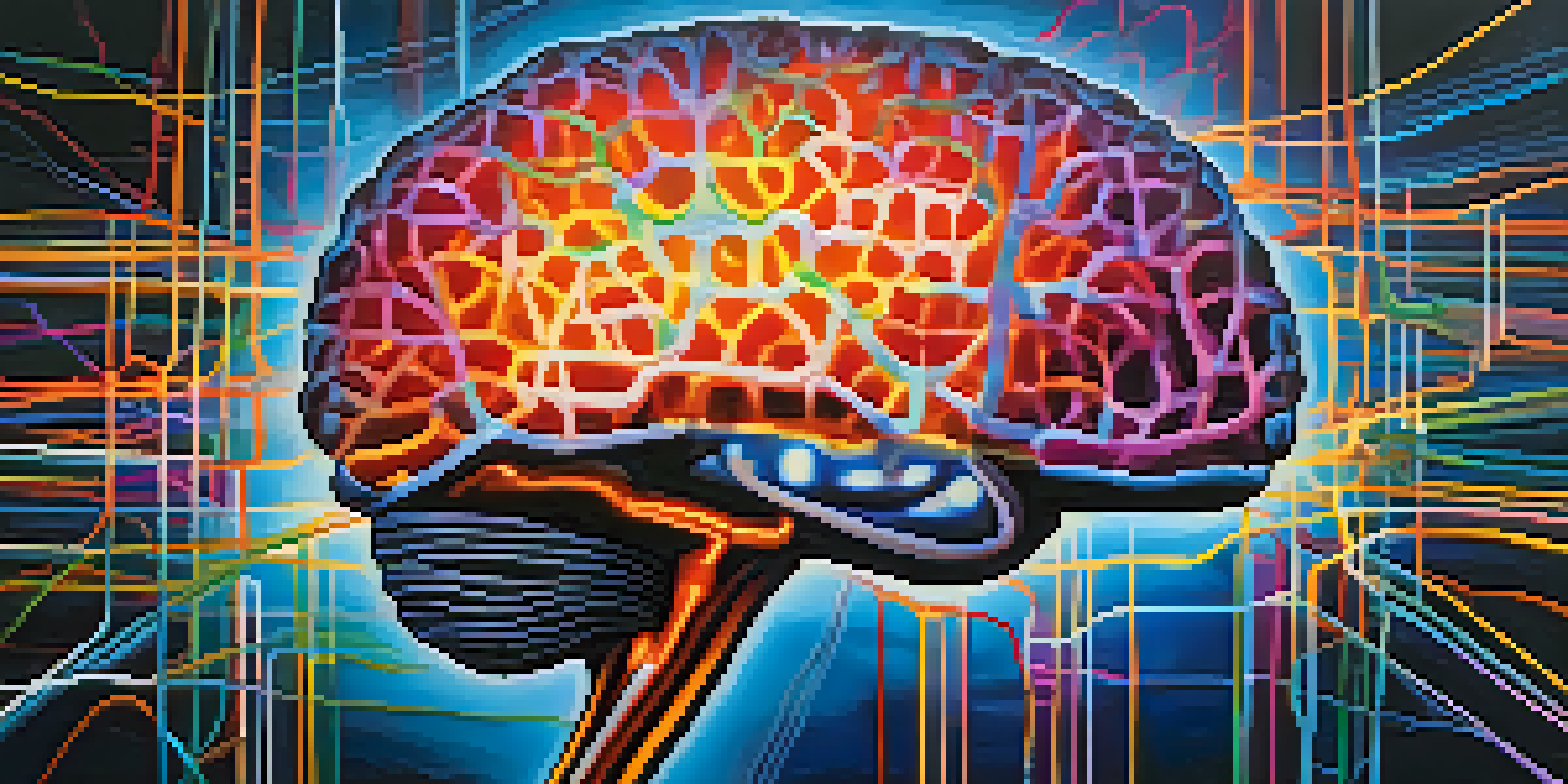Ketamine in Therapy: Transformative Patient Experiences

Understanding Ketamine: Beyond Anesthesia
Ketamine is often known for its use as an anesthetic in medical settings, but recent research has uncovered its potential in treating mental health conditions, particularly depression and anxiety. Unlike traditional antidepressants, ketamine works differently in the brain, targeting the N-methyl-D-aspartate (NMDA) receptor to promote rapid improvement in mood. This unique mechanism has led to a surge of interest in its therapeutic applications.
Ketamine shows promise as a fast-acting treatment for depression, offering hope to those who have struggled with traditional therapies.
Patients who have struggled with long-term depression often find that conventional treatments can take weeks or even months to show results. In contrast, ketamine therapy can provide relief within hours, offering a glimmer of hope for those who feel they have exhausted all other options. This rapid response is a game-changer, particularly for individuals facing suicidal thoughts.
While the use of ketamine in therapy is still evolving, its potential to transform lives is becoming increasingly evident. As more people share their stories, it’s clear that ketamine offers a new avenue for healing, making it an exciting development in the field of mental health.
Patient Experiences: Life-Changing Transformations
Many patients report profound changes in their mental health after undergoing ketamine therapy. For instance, one individual shared that after just a few sessions, they felt a sense of clarity and relief that they had never experienced before. This newfound perspective allowed them to engage in life more fully and pursue their passions without the heavy weight of depression holding them back.

Another patient described their experience as a 'reset' button for their brain. They found themselves able to confront issues that had previously felt insurmountable, such as past trauma or relationship difficulties. This transformative experience can be likened to lifting a fog that has clouded their mind for years, revealing a brighter landscape of possibilities.
Ketamine's Rapid Relief for Depression
Ketamine therapy can provide relief from depression and anxiety within hours, contrasting sharply with traditional treatments that may take weeks.
These testimonials highlight the unique capability of ketamine therapy to provide immediate relief and foster long-lasting change. As more patients share their journeys, the narrative around mental health treatment continues to evolve, paving the way for innovative approaches.
The Science Behind Ketamine: How It Works
At its core, ketamine therapy harnesses the brain's neuroplasticity—the ability to form new neural connections. When administered in controlled settings, ketamine triggers the release of various neurotransmitters, including glutamate. This surge helps to stimulate growth in brain cells and connections, which is crucial for recovery from mental health disorders.
The combination of ketamine therapy and psychotherapy can be a powerful tool for transformation, addressing both symptoms and underlying issues.
Research shows that ketamine can lead to an increase in synaptogenesis, or the formation of new synapses, which enhances the brain's ability to adapt and heal. This process is particularly important for individuals who have experienced chronic stress or trauma, as it allows them to break free from negative thought patterns that may have taken root over time.
Understanding the science behind ketamine not only enhances its credibility as a treatment option but also reassures patients that their experiences are grounded in research. It offers a fascinating glimpse into how innovative therapies can reshape our understanding of mental health.
The Role of Therapy in Ketamine Treatment
While ketamine can significantly alleviate symptoms of depression and anxiety, pairing it with therapy can enhance its effectiveness. Many mental health professionals advocate for an integrated approach that combines the rapid relief from ketamine with therapeutic techniques that address underlying issues. This dual approach can create a more holistic pathway to recovery.
Therapists often guide patients through their experiences, helping them process emotions and thoughts that arise during ketamine sessions. This can be particularly beneficial as patients confront feelings or memories that may have been buried for years. The therapeutic aspect helps bridge the gap between the immediate effects of ketamine and long-term healing.
Transformative Patient Experiences
Many patients describe their ketamine therapy as life-changing, likening it to a 'reset' that allows them to confront deep-seated issues and embrace life anew.
In this way, ketamine therapy becomes not just a quick fix but a catalyst for deeper self-exploration and understanding. As patients engage in therapy, they gain tools to manage their mental health more effectively, ensuring that the benefits of ketamine persist long after the treatment sessions end.
Potential Risks and Considerations
Like any treatment, ketamine therapy comes with its own set of risks and considerations. While many patients experience positive outcomes, some may encounter side effects such as dissociation or increased blood pressure. It’s essential for patients to discuss these risks with their healthcare provider to ensure they are well-informed before starting treatment.
Another important consideration is the setting in which ketamine is administered. It’s crucial that patients receive treatment in a controlled and safe environment, ideally under the supervision of a qualified professional. This not only guarantees proper monitoring but also helps patients feel secure during the experience.
Ultimately, weighing the potential benefits against the risks is a personal decision that should be made in collaboration with a healthcare provider. Open communication about expectations and concerns can help set the stage for a successful treatment experience.
The Future of Ketamine Therapy in Mental Health
As interest in ketamine therapy continues to grow, researchers and practitioners are exploring its broader applications in mental health. Current studies are investigating its efficacy for conditions like PTSD, OCD, and even substance use disorders. This expansion could lead to a more comprehensive understanding of how ketamine can support a variety of mental health challenges.
Furthermore, the conversation around ketamine therapy has opened doors for other innovative treatments. As mental health professionals look for new ways to help patients, the success of ketamine may inspire further research into alternative therapies that can provide similar rapid relief or healing.
Importance of Integrated Therapy
Combining ketamine therapy with traditional therapeutic techniques enhances the overall effectiveness and helps sustain the positive effects long-term.
The future of ketamine therapy holds promise not only for those seeking immediate relief but also for the evolving landscape of mental health treatment as a whole. By embracing new approaches, the field can move toward more effective and individualized care.
Finding the Right Provider for Ketamine Therapy
Choosing the right provider for ketamine therapy is a crucial step in ensuring a positive experience. Look for practitioners who specialize in mental health and have experience administering ketamine. It's important to feel comfortable and confident in their approach, as this can significantly impact the overall treatment process.
Many clinics offer consultations to discuss the potential benefits and risks of ketamine therapy. During this initial meeting, it’s an excellent opportunity to ask questions and gauge the provider's expertise. Trust your instincts—finding a provider who aligns with your needs can make all the difference.

Additionally, consider seeking out reviews or testimonials from previous patients. These insights can provide a sense of the clinic's reputation and the experiences of others who have undergone treatment, helping you make a more informed choice.